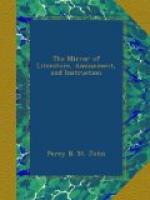the observance of customary rules; but elevated to
his present distinction, it is plain that he enjoys
all the little peculiarities of his office. Somebody
said that he presided in the House of Lords in a bar
whig, and instanced the fact as a proof of his reforming
temper; but it was not true. Accident may have
obliged him to take his seat in this ungainly form,
but he had no purpose of deviating from the ancient
full-bottom, and he is now to be seen in all the amplitude
of the olden fleece. In like manner he observes
the strict regime, so fantastical to a stranger,
of causing counsel to be shouted for from without,
although they are actually present; and he adds to
the oddness of this custom by receiving them with
a most imposing mien, and putting on his chapeau as
they advance. This is a form, for which the model
is not to be found in the practice of his immediate
predecessors. It is possible, however, that his
extensive and minute reading may have made him aware
that Wolsey, peradventure, or some great chancellor
of old, had the fancy to be covered when the suppliants
approached. Let any one observe with what studied
dignity he performs the duty of announcing the royal
assent to Acts of Parliament: he assumes a solemnity
of tone for which his voice is not ill-fitted, but
which is unusual with him. These small circumstances,
and many such which might be mentioned, show that State
is not uncongenial to his mind. Why should it?
His weakness consists in the unreal contempt for what
is not really contemptible. With his high notions
of office, I should have been surprised if he had foregone
the levee; and assuredly he has not reckoned without
reason; for a more splendid or flattering pageant
could not be witnessed than that which his rooms exhibited.
Unquestionably the most remarkable man in the empire
at this moment, it is his fortune to attract the honourable
regards of all who are distinguished as compeers.
It is not my intention to offer any estimate of what
I conceive to be his genuine worth, as he may be appreciated
in a more dispassionate time; I speak of him only
as a great man filling a very large space in the consideration
of the empire. Judging from the throng of all
classes upon this occasion, whose favour is desirable,
no man is more popular * * *. The Chancellor
took his place at a corner of the room, backed by
his chaplain, and was soon encircled by the visitants;
his dress remarkably plain, being a simple suit of
velvet in the court cut. The names were announced
from the bottom of the stairs, and each person as
he entered walked up to the Chancellor and offered
his respects. The numbers were so great that
it was impossible to devote any marked attention to
each; as soon, therefore, as the visiter had made his
bow, he retired into the throng, or took his departure
through the adjoining room. I was not present
at the first of the levees which were held, and at
which the attendance was very distinguished; but a
friend who was, spoke very highly of the manner in




